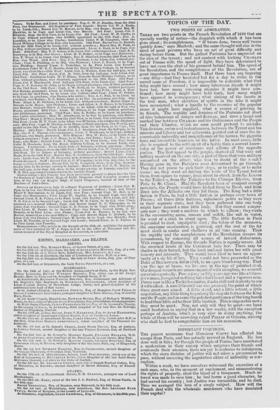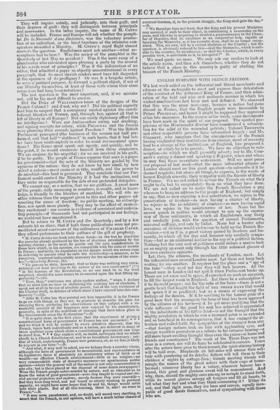IMPORTANT INQUIRIES.
THE papers announce that Monsieur COTTU has effected his escape from Paris, and has actually arrived in England. He has done well in this ; for though the people of France have manifested a moderation in their victory which surprises their friends and confounds their enemies, there are yet boundaries to indulgence; which the stern dictates of justice will not allow a government to pass, without incurring the imputation either of imbecility or cor- ruption. -Within a week, we have ourselves witnessed the execution of a rash man, who, in the moment of excitement, and misconstruing the rights of property, shed the blood Of 'a trespasser. Much in terest was made to save him ; he had borne a good character, he had served his country ; but Justice was inexorable, and he died. Thus we avenged the loss of a single subject. How will the French deal with the wholesale Murderers who have desolated their capital ? . They will inquire calmly, and judicially, into their guilt, and their degrees of guilt : they will distinguish between principals and accessories. In the latter 'inquiry, the name of M. Cony will be included. France and Europe will ask whether the pamph- let De la Necessite dune Dictature, was the voluntary produc- tion of an individual, or the hired brochure of the infamous con- spirators miscalled a Ministry. M. COTTU'S rapid flight almost answers the question. Englishmen must ask another—what ac- complices had he here ? Was the review of the pamphlet in the Quarterly of last May an accident ? Was it the mere essay of a placehunter who calcucated upon pleasing a party by the avowal of his servile want of principles ? Was it the indiscretion of an editor, that admitted a paper so abjectly unconstitutional in every paragraph, that its most slavish readers must have felt disgusted at the openness of its profligacy ? Or was it a bespoke article, to serve d political purpose, to forward a political object, if not of our Ministry themselves, at least of those with whom their close connexion had long been notorious ?
The last question is the most important, and, if we mistake not, will be the most difficult to answer.
Did the Duke of WELLINGTON know of the designs of the French Cabinet? and if not, why not ? Did his political sagacity lead him to suspect that a conspiracy existed against the consti- tutional liberties of France, and, through her, against all that is left of lib6rty in all Europe ? Did our costly diplomacy afford him no intelligence ? Were our Ambassadors eating and drinking, and signing receipts for salaiy, while POLIGNAC and the Jesuits were planning their crusade against Freedom ? Was the British Parliament prorogued (the business of the session not half per- formed, and that half" slubbered" in such haste, that it had bet- ter have been unattempted) in order to avoid inconvenient ques- tions? His Grace must speak out openly, and quickly, and to the point, if he would exonerate himself from these suspicions. We are anxious for his acquittal ; for we are involved in his guilt, if he be guilty. The people of France suppose that ours is a popu- lar government—that the acts of the Ministry are guided by the opinions of the nation : they do not know by how small, by how select a coterie—most eminent in title, wealth, and the power to do mischief—this land is governed. They conclude that our Par- liament could control the Ministry if it had the inclination, and they make us responsible for the acts of our pretended delegates.
We cannot say, as a nation, that we are guiltless. A great mass of the people, daily increasing in numbers, in wealth, and in know- ledge, is friendly to the liberties of mankind. We will cite no other witness than the support given to this and other papers ad- vocating the cause of freedom : no public meeting, no subscrip- tion, can speak more plainly. They may be the effect of momen- tary excitement : our course is evidence of consistent and undevia- ting principle—if thousands had not participated in our feelings, we could not have maintained it.
But to return to M. COTTU and the Quarterly; and by a few extracts let us show, that if both these publications were not pre- meditated avant courreurs of the ordinances of CHARLES CA.PET, they afford pretensions to their authors of the gift of prophecy.
"M. Cottu divides his book into three heads—in the first he describes the anarchy already produced by the law of elections established by the existing charter ; in the next, he points out the only modifications in those laws which, in his opinion, are compatible with the state of society in France ; and lastly, he expatiates on the danger which the crown runs in deferring to assume what he calls the dictatorship—a measure, as he conceives, rendered indisputably necessary for the salvation of the coon- try."—Quarterly Review, 215. He goes on to state, however, that as there was nothing very extra- ordinary—at least according- to the nature of his own countrymen" (!!!) " in the horrors of the Revolution, so no one need be in the least surprised, should the same scenes be re-enacted upon the first fitting op- portunity."-216. "Thus, then," continues our plain-spoken author, "when I declare that we must lose no time in abolishing the existing law of elections, I speak not at all in favour of absolute power, but of the very existence of the Charter itself, in defence of which alone I have entered into this con- troversy."-222.
"After M. Cottu has thus pointed out how impossible it is for France to go on with things as they are, he proceeds to describe his plan for changing them, prefacing his observations on this subject with a re- markable account of the happiness now enjoyed by his countrymen, generally, in spite of the multitude of changes that have taken place in the Government since the Restoration."—lb.
" It is quite clear, in the first place, that the experiment of giving a constitutional form of government to France has not succeeded ; * * * and we think it will be evident to every attentive observer, that the French, taken both individually and as a nation, are deficient in many of those qualities upon which alone a constitutional government can hope to stand firm. * • Our readers will, no doubt, anticipate that we allude chiefly to a Church Establishment, and to an hereditary Aristocracy ; nei- ther of which, unjOrtunately, France now possesses, or, as we fear,is likely to acquire in our time."—lb. "And what, it may well be asked, are we to hope from a country where, although the form of government be monarchical, and representative in its legislature, there is absolutely no aristocracy either of birth or of 'wealth—no effective Church establishment—little or no religion—no very commendable state of domestic manners—no spontaneous public Opinion—where the general will of the nation is not only concentrated in one city, but is there placed at the disposal of some dozen newspapers ? Were the French people sober-minded by nature, and so educated as to know the value of good government—were they taught to respect and che- rish ancient prejudices and customs, merely because they were venerable— had they been long tried, and not found so utterly wanting in political sagacity, we might have some hopes that by and by, things would settle into their places. But of all this training, there is, alas I no trace in France."—/b. "It may seem paradoxical, and, no doubt, will sound very startling, to assert that the French, in our opinion, will have a much better chance of eventual freedom, if, in the present struggle, the King shall gain the day." —/b• " We therefore hope and trust, that the King and his present Ministers may succeed, if such be their object, in establishing a censorship on the press, and likewise in acquiring so decided a preponderance in the Cham- ber of Deputies, that its existence as an independent body, capable of bearding the Monarchy, as it has recently done, shall be no longer recog- nized. This, we own, will be a virtual abolition of the Charter ; but the question is obviously reduced to this—shall the Monarchy, which is suit- able to the country, be overthrown ; or shall the Charter, which, in every possible view, is unsuitable to it, be abrogated ?" lb.
We need quote no more. We only ask our readers to look at the article again, and then ask themselves, whether they do not believe that a class in this country is guilty of abetting the treason of the French Ministry.



























 Previous page
Previous page